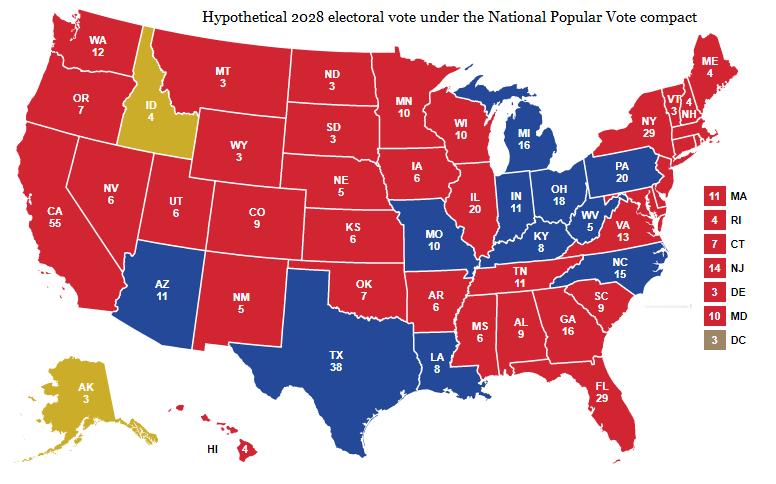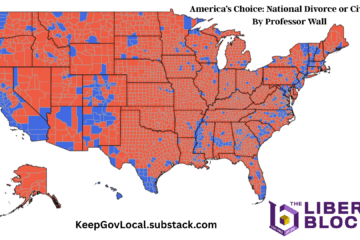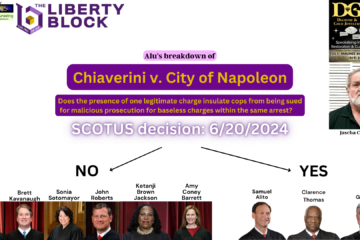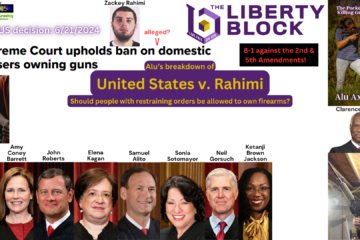In the wake of the 2024 presidential election, in which a Republican again won in the Electoral College despite losing the popular vote, enough states have joined the National Popular Vote Compact to put it into action. Twenty-two states now legally require their Electoral Votes to be awarded to the winner of the nationwide popular vote. President Kevin Stitt, the dark horse who won the GOP nomination and then put together enough states to defeat popular vote leader Cory Booker on Nov. 5th, 2024, is facing a complex and difficult 2028 re-election campaign. In addition to Democrat nominee Senator Kyrsten Sinema, he faces Rep. Jeff Hewitt representing the Libertarian Party and Independent candidate Tulsi Gabbard, a vocal critic of Stitt’s interventionist foreign policy, as well as several other alternative party candidates. Sinema’s push to the middle turns off much of the progressive/socialist wing that feels like it has been abandoned by the Democrats, moving them towards Gabbard and, perversely, Stitt. Hewitt, benefiting from Libertarian Party growth during strong campaigns by Justin Amash in 2020 and the Sharpe/Ebke ticket in 2024, strongly demands that the national debt and entitlement spending be dealt with before the nation is completely bankrupt. After an incredible campaign with more twists and turns than a cheap garden hose, America sees its first president elected under the National Popular Vote Compact. Although Stitt would not have been re-elected if he were only able to rely on the old Electoral College system, the Republican gets another term due to winning the popular vote.
WHAT?!?
Let’s look at that national popular vote:
Stitt — 55,645,107 34.13%
Sinema — 55,208,138 33.86%
Hewitt — 30,832,424 18.91%
Gabbard — 15,114,573 9.27%
Others — 6,248,010 3.83%
Total — 163,048,252 100%
Stitt wins pluralities in Republican strongholds in the west and south, but only achieves majorities in his native Oklahoma, and Wyoming, Utah, and Kansas. If the traditional electoral college system were still in place, the incumbent Republican president only would have earned 110 electoral votes (out of 538). However, despite plurality wins in the Midwest and in every NPV state, Sinema falls a little over 400,000 votes short in the total vote. Hewitt wins narrow pluralities in Idaho and Alaska but takes second in over a dozen ‘red’ states as well as Maine, New Hampshire, and New Mexico, all NPV states where Sinema received more votes than anyone else. Gabbard won a majority in Hawaii but NPV sent those electoral votes to Stitt, so the progressive anti-interventionist only picked up the District of Columbia’s 3 electoral votes.
Many of you may suggest that if something like this happens where the actual votes of all National Popular Vote Compact states were to be thrown out and their electoral votes go to some candidate other than the one who won in that state that the Electoral College voters would still have the opportunity to ‘correct’ the result. However, twenty-nine states legally penalize so-called faithless electors, including ten of the fifteen current signatories to the NPV Compact. Even if the trend to further prohibit members of the Electoral College from exercising discretion does not continue, the current situation would make it very difficult for such a ‘correction’ to take place and would invariably result in the election being tied up in the federal court system.

The movement for a national popular vote is reactive rather than proactive, pushed initially by those who sought a remedy to the 2000 presidential election when Al Gore won the popular vote but lost the Electoral College to Bush, and more recently by the same sentiment after a similar outcome in 2016. This is why an idea that is claimed to just be a reform that will benefit everyone is actually a misguided partisan effort that cannot win approval beyond one party in the current political climate. Like generals who always try to fight the last war, most national popular vote adherents are seeking to overturn history instead of preparing for the invariably different situations presented by the future. If the Electoral College is indeed outdated and harmful it should be repealed outright, not effectively nullified via a complex and problematic scheme like the NPV Compact.
However, the fatal flaw of a national popular vote is that it would exacerbate the first-past-the-post system, putting all voters at the mercy of the plurality. NationalPopularVote.com claims that NPV “would guarantee the Presidency to the candidate who receives the most popular votes” but thanks to first-past-the-post this is absolutely false as a plurality means that most voters chose someone else. Nineteen of our presidential elections, including four of the last six, have been ‘won’ with less than 50% of the vote, a situation that NPV will do nothing to fix. If you are frustrated that over 50% of the voters in the US (and 70% of the people in the US) could be forced to live under a president that they voted against, do not look to NPV to remedy this. A better idea would be an election system with a built-in requirement for the winner to have the support of a majority of voters, such as ranked choice voting, approval voting, or range voting. These systems allow voters to express preferences for more than one candidate. Unless and until NPV incorporates a method to ensure a true majority it will remain a tool of partisan advantage, not a real reform.
Another consequence of changing from our current system to a national popular vote that gets little attention is that it would fundamentally change the nature of our presidential campaigns. There is the discussion of the possibility that states with smaller populations could be disadvantaged as candidates would focus even more on large metropolitan areas in a purely popular vote based system, but the real change would be to a completely national approach. Right now our presidential election is comprised of fifty-one concurrent elections. Each of those fifty-one contests has its own peculiarities in rules and electorate, one of the last places where the nature of our country as a union of States remains evident. In my view, it is a genuinely and uniquely American approach which should not be discarded over temporary objections. It also separates the votes into different jurisdictions, limiting the damage from election irregularities and fraud. Imagine a presidential election that comes down to a difference of a few thousand votes across the country. A national recount would take weeks, if not months, and would be rife with litigation. The specter of hanging chads necessitating hand-counting of a hundred and thirty million ballots should frighten any observer of politics. Naturally, efforts by foreign nations to influence the outcomes of elections are would only become easier in a more nationalized system.
The National Popular Vote Compact has inherent flaws and would further entrench the faulty first-past-the-post system that thwarts the majority by giving election victories to unpopular plurality winner candidates. Americans ought to reject NPV and instead seek real election reform that is something more than just an attempt to retroactively overturn the results of the last presidential campaign.
This article does not necessarily reflect the opinions of The Liberty Block or any of its members. We welcome all forms of serious feedback and debate.


